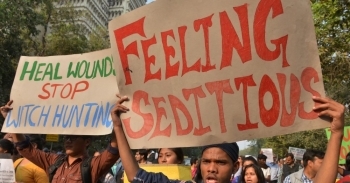
.jpg) Ramesh Menon
Ramesh Menon

If India has to evolve as a throbbing democracy, there should be no place for Section 124A of the Indian Penal Code, commonly known as the sedition law. India has enough laws to deal with sedition. But the sedition law has been grossly and shamelessly misused by various central and state governments to stifle dissenting voices and anything critical about its institutions, governance, and functioning.
It is a tool to punish those who speak truth to power. 124A has no relevance in a democracy. It has been used to suppress dissent, criminalise political criticism, and tag those who speak up as anti-national in the last few years. It was repeatedly used to settle scores with politicians, students, human rights activists, lawyers, and journalists.
According to Article 14, a media and research group, over 13,000 were booked in 867 cases in the last 12 years. Interestingly, only 13 of them were found guilty in sedition cases. It eloquently showed how the law had become a tool to intimidate and create fear as these cases had no evidence to stand on. It was to throw people into jail for excessive periods.
Bihar led from the top with maximum cases, followed by Tamil Nadu, Uttar Pradesh, Jharkhand, and Karnataka.
In various judgments, the court has held that it can be sedition only if the statement or written words had the potential to result in disorder or violence. But, the new normal in India is arresting people who speaks or writes against a political entity in power or the government.
In 1962, a five-judge bench of the Supreme Court in the Kedar Nath Singh case ruled that unless there was a call to violence or an intention to disrupt public order, it could not be considered sedition. But, as events proved down the years, various state and central governments have used it to beat dissent. Here are some examples: The Assam police charged journalist Anirban Roy Choudhury with sedition for writing about a lawyer who was charged with sedition. Navneet Rana MP and husband Ravi Rana MLA were accused of sedition for saying that they would recite the Hanuman Chalisa outside the Chief Minister's house. An accused can spend around 50 days in prison until a trial court grants bail. It could be around 200 days until a High Court does so.
The British spun the law with the specific aim to quell the rising demand for independence. Many freedom fighters like Mahatma Gandhi and Bal Gangadhar Tilak were jailed under this law. Even after independence, the powers-that-be for the last seven-and-a-half decades did not think it apt to remove it as it was a convenient tool to terrorise the Opposition. Instead, it was amended to make it more stringent. It now provides for a maximum punishment of life imprisonment. The police can arrest you without even a warrant. It is a cognisable, non-bailable, and non-compoundable offence.
When petitioners that included stalwarts like former minister and BJP leader Arun Shourie challenged it in the Supreme Court, the judges saw no reason to let it continue as governments had abused it. They said so in clear words.
Earlier, Chief Justice N V Ramana said that the continuance of this law was a serious threat to the functioning of institutions and individual liberty. Justice Sanjay Kaul had also noted that ex
The Supreme Court pointed out that we have enough laws to deal with situations that would amount to sedition without a specific law. Moreover, it went against the basic principle of freedom of speech.
The government had defended the law, but when it sensed the court's view, it agreed to review it. The court has decided to keep the judgment pending until the review is done. It did well to say that until then, no one could be arrested under the Act, and those under trial could approach the courts for relief. All future proceedings under Section 124A will be kept in abeyance.
It must have seemed like a breath of fresh air to thousands feeling stifled about small things like making a statement, putting out a social media post, and so on. People have been booked for ridiculous things like making harmless speeches, social media posts, and even chanting Hanuman Chalisa in the recent past.
Between 2010 and 2021, the police have used the section to book numerous student leaders, politicians, activists, journalists, and ordinary citizens to silence them and send out a message that this could happen to you and me.
Article 19 of the Constitution guarantees the right to free speech and ex
Deepak Gupta, a former Supreme Court judge, said that criticism of the legislature, executive, judiciary, bureaucracy, or the armed forces could not be termed sedition. If we stifled such voices, India would become a police state, he added.
While the Opposition hailed the stand of the Supreme Court, asking the government to reconsider the present sedition law, Law Minister Kiren Rijiju said that the court must respect the government and the legislature and that "Lakshman Rekha" must not be crossed by anybody. That, in essence, should tell us what the government thought when it got time from the court to review the law.